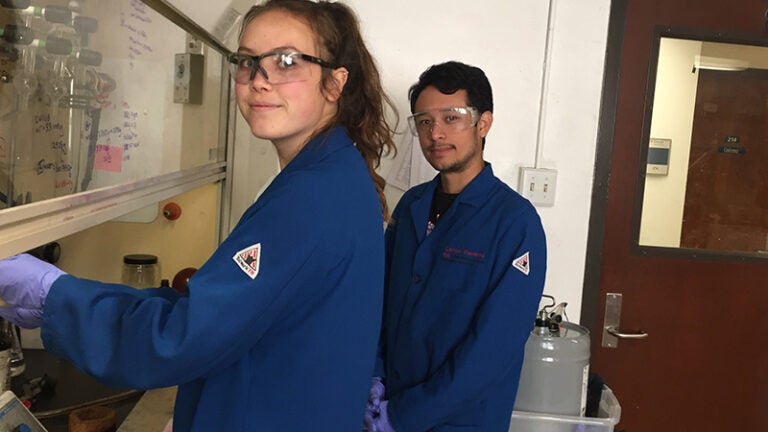
Research bid to recycle aircraft waste takes flight
It’s a disturbing image: Airplane carcasses line thousands of acres of California’s Mojave Desert and other boneyards throughout the Southwest, baking under a hot sun.
Their shells contain CFRP, a lightweight, strong, carbon fiber composite material that improves fuel efficiency and is increasingly used in planes, automobiles, trucks and sports equipment.
“Global demand for this material is in the hundreds of thousands of tons,” which is producing piles of bulky, difficult-to-recycle waste, said Katelyn Michael. The chemistry major, who graduates this year, helped develop a technology that could provide a solution by recycling the scrap.
Michael works with Ph.D. student Carlos Navarro in Professor of Chemistry Travis Williams’ lab. The two are part of a research team called Closed Composites that has built a proprietary chemical process to extract high-quality carbon fibers for reuse in products from cars to wind turbines. The process works by depolymerizing the plastic-like resin holding the fibers together.
Eye on the prize
Michael and Navarro had just five minutes to make their case before a panel judging this year’s USC Wrigley Sustainability Prize. The annual competition, conducted by the USC Wrigley Institute for Environmental Studies, supports environmentally conscious entrepreneurial ideas generated within the USC community. Michael and Navarro’s team was competing with seven other finalists for seed money to build their sustainable business ideas.
The pair took turns laying out the problem they aimed to address — massive amounts of CFRP are accumulating on Earth, and current recycling methods using pulverization at extremely high temperatures come up short.
“In the process, the plastic turns into gas that pollutes the atmosphere,” and the end product isn’t worth much, explained Michael. “This is inefficient, energy-intensive and irresponsible, so we need to do better.”
Their idea would first target the 40 percent of total material that is scrapped before it’s even put to use, largely due to manufacturing inefficiencies. CFRP is difficult to recycle because of a plastic-like resin that holds the carbon fibers together, explained Michael. “Once cured, it is very difficult to separate it from the fibers.”
The business plan calls for buying inexpensive scrap from producers including Boeing and Airbus and selling recovered fibers at a profit. The technology could also be licensed to established recyclers. Later, end-of-service waste such as the decommissioned aircraft waiting in the Mojave would be added to the mix. And, the resin holding the material together could be recycled into organic chemicals for resale.
“Thirty years of research in this field has not resulted in a responsible recycling strategy, but Closed Composites has developed one in two,” Michael declared in conclusion.
After the judges conferred, the Closed Composites pitch took the day, earning the $7,000 top prize.
Michael also presented the research at the USC Undergraduate Symposium for Scholarly and Creative Work, earning second prize in the physical sciences, math and engineering category.
A life of sustainability ahead
Michael said the prizes reward the kind of curiosity that led her to seek undergraduate research opportunities at USC Dornsife that focus on projects that were in their infancy.
“Having the independence to start a new project that had very little background research already completed was something that was very appealing to me.”
She also felt drawn to projects that could help solve environmental problems. “I am from Washington state, and the outdoors have always been a very important part of my life. Doing research in sustainability is something I really want to do.”
After completing her USC Dornsife studies, Michael will attend graduate school in materials chemistry and inorganic chemistry at the University of Wisconsin-Madison. She expects to work in industry after earning her doctorate.
“Always working with my hands in the lab, that’s what I want to do.”